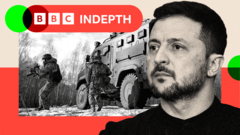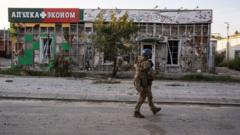In the midst of Russia's recent offensives, the ongoing conflict in Ukraine faces critical turning points as discussions of a potential end approach, particularly with the shift in US leadership on the horizon. Observers speculate whether the arrival of Donald Trump in the White House might usher in a new phase for Ukraine, despite uncertainties over the dynamics involved. Meanwhile, Ukrainian officials are positioning themselves to present a unified front as their nation confronts the harsh realities on the battlefield.
**The Potential Resolution of the Ukraine Conflict by 2025**

**The Potential Resolution of the Ukraine Conflict by 2025**
As Russia gains ground, questions arise about the future landscape of Ukraine and the role of US politics in ending the war.
The current trajectory of the conflict hints at a resolution looming by 2025, especially with Trump's promises of swift negotiations to conclude the war. However, uncertainties persist regarding the long-term implications for Ukraine and the surrounding geopolitical climate. As the world watches, the unfolding situation remains precarious and significant.
Russia's ongoing offensive in Ukraine signals a critical phase in the three-year conflict. President Vladimir Putin claims to see movement along the front lines, while Ukrainian civilians are caught between fleeing and facing escalating violence. Despite Ukraine's strains, the prospect of peace may depend heavily on the incoming US administration under Donald Trump.
Trump's stated commitment to resolving the conflict quickly clashes with doubts about his intentions, as advisers warn of the war's deteriorating situation and lack of clear strategy. Ukrainian officials express skepticism toward peace talks, arguing that Russia must face substantial consequences for its actions before negotiations can commence.
In response, President Zelensky seeks to build relationships that could appeal to Trump's transactional approach. As Zelensky promotes his "Victory Plan," which includes replacing US forces in Europe with Ukrainian troops post-war, this strategy aims to fortify alliances that could benefit Ukraine in the long run. However, key elements of his plan, particularly NATO membership, continue to elicit lukewarm responses from allies, undermining Ukraine's security assurances.
As the odds stack against Ukraine in military engagements, maintaining robust legal guarantees with Western allies appears increasingly vital to prevent future aggressions from Russia. Meanwhile, the threat of stark sanctions against Moscow backstage fuels international discussions, as optimism wanes over their effectiveness in crippling the Russian economy.
The war's costly toll continues, prompting both allies and adversaries to reconsider their strategies. With severe challenges ahead, including decisions that could shape Europe's security landscape and Ukraine's territorial integrity, the conflict's resolution may ultimately rest upon the political tides existing in 2025.
Russia's ongoing offensive in Ukraine signals a critical phase in the three-year conflict. President Vladimir Putin claims to see movement along the front lines, while Ukrainian civilians are caught between fleeing and facing escalating violence. Despite Ukraine's strains, the prospect of peace may depend heavily on the incoming US administration under Donald Trump.
Trump's stated commitment to resolving the conflict quickly clashes with doubts about his intentions, as advisers warn of the war's deteriorating situation and lack of clear strategy. Ukrainian officials express skepticism toward peace talks, arguing that Russia must face substantial consequences for its actions before negotiations can commence.
In response, President Zelensky seeks to build relationships that could appeal to Trump's transactional approach. As Zelensky promotes his "Victory Plan," which includes replacing US forces in Europe with Ukrainian troops post-war, this strategy aims to fortify alliances that could benefit Ukraine in the long run. However, key elements of his plan, particularly NATO membership, continue to elicit lukewarm responses from allies, undermining Ukraine's security assurances.
As the odds stack against Ukraine in military engagements, maintaining robust legal guarantees with Western allies appears increasingly vital to prevent future aggressions from Russia. Meanwhile, the threat of stark sanctions against Moscow backstage fuels international discussions, as optimism wanes over their effectiveness in crippling the Russian economy.
The war's costly toll continues, prompting both allies and adversaries to reconsider their strategies. With severe challenges ahead, including decisions that could shape Europe's security landscape and Ukraine's territorial integrity, the conflict's resolution may ultimately rest upon the political tides existing in 2025.























